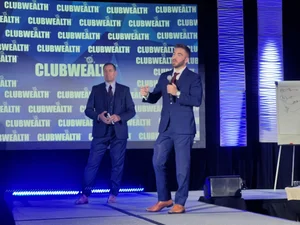Everyone sees the highlight reel. The “just sold” posts, the champagne toasts, the fancy new headshots.
What you don’t see are the deals that collapse mid-escrow, the clients who vanish after promising they’re “ready to buy,” or the nights spent triple-checking contracts because you’re terrified of missing something.
That first year in real estate is a mix of adrenaline, confusion, and growth you didn’t expect but absolutely need.
It’s not something to dread. It’s the year that builds your foundation. Every late-night call, every deal that falls apart, every awkward showing that makes you want to sink into the floor... all of it shapes you into the kind of agent who lasts.
You don’t need to have it all figured out yet. You just have to keep showing up, learning, and giving yourself a little grace along the way.
Let’s talk about what that first year really looks like and how to come out stronger on the other side.
The Expectations vs. Reality Check
Most new agents start with the same idea. “I want freedom, flexibility, and fast success.”
You imagine mornings at coffee shops, mid-day gym breaks, and clients who can’t wait to work with you.
Then reality hits. You’re showing homes at 8 p.m., answering texts at 10, and realizing that “flexible” schedule mostly means working when everyone else isn’t.
The first year isn’t about mastering real estate, it’s about mastering yourself.
You’ll juggle excitement and exhaustion, confidence and self-doubt, sometimes in the same day. You’ll have weeks packed with showings and no closings, followed by one win that makes it all click again.
That up-and-down rhythm isn’t failure. It’s how you grow.
The agents who make it through year one aren’t the luckiest, they’re the most consistent. They learn to manage their time, energy, and mindset even when things don’t go to plan.
The Myth of “Freedom”
Freedom sounds amazing until you realize it’s also responsibility.
No one’s standing over your shoulder. No one’s telling you what to do next. You decide how disciplined you’ll be.
I’ve seen plenty of new agents mistake “freedom” for “winging it.” But success in real estate comes from structure, not spontaneity.
Create a daily routine early, even if it’s simple. Start your mornings the same way. Schedule your lead follow-ups. When you finish for the day, actually stop.
Always On, Rarely Off
That “flexible schedule” everyone talks about really means your clients are available when the rest of the world isn’t.
Evenings, weekends, holidays, you name it. In year one, you’ll probably say yes to everything because you’re building momentum.
That’s normal, but it’s not sustainable. Responsiveness matters, but being available 24/7 doesn’t make you better at your job. It just makes you tired and burnt out.
Setting clear expectations protects your sanity and earns respect. When clients know what to expect, they feel cared for without needing constant contact.
How to Stay Grounded When You’re On Call 24/7
A few habits that help:
Communicate clearly from day one. Tell clients when you work, when you rest, and how quickly you respond. It prevents stress later.
Automate the repetitive stuff. Use templates, reminders, and a CRM to take care of follow-ups. It frees you to focus on relationships, not admin.
Group similar tasks. Handle calls in one block, showings in another. Switching between ten different things all day drains your energy fast. (Here’s a recent post I did on time blocking you most definitely want to check out).
Protect personal time. Even one unplugged evening a week keeps you grounded.
Balance isn’t optional. It’s the skill that keeps you in the game.
When Deals Fall Apart (And Don’t Worry, It’s Normal)
Sooner or later, you’ll lose a deal that looked perfect. Financing falls through. Inspections go sideways. The client suddenly “needs to wait a few months.”
It stings. Especially when you’ve poured hours into it. But it’s part of the process.
Roughly a quarter of deals collapse before closing, no matter how skilled the agent. You can’t control that, but you can control how you respond.
Staying calm and professional in those moments earns you more trust than any flawless transaction. Clients remember who stood steady when things fell apart.
Turning Lost Deals into Lessons
Every deal that dies leaves you with something valuable:
How to communicate expectations earlier.
How to spot red flags sooner.
How to navigate emotions when everyone else is spiraling.
Those lessons build confidence. Each time, you get a little stronger, a little wiser, a little less shaken when things don’t go your way.
That’s the quiet growth that turns a new agent into a seasoned one.
Communication Is the Hidden Skill That Makes or Breaks You
Real estate is half endurance, half communication.
The transactions that fall apart rarely do because of market conditions, they fall apart because someone stopped communicating clearly.
You’re the middle point between clients, lenders, inspectors, and other agents. Everyone’s depending on you to translate, clarify, and keep things moving.
The better you get at that, the smoother everything becomes.
Boundaries That Build Trust
You don’t need to respond to every message the moment it pings. What you need are systems that show your clients you’re on top of things.
Send short summaries after major conversations. Keep your clients updated before they have to ask. Have templates ready for common questions.
Responsiveness is about reliability, not speed. When people know they can count on you to keep them informed, they relax. That’s what builds long-term trust.
What Actually Gets You Through Year One
Forget chasing perfection. Focus on building consistency.
Motivation comes and goes, but systems stay.
The agents who make it through year one don’t rely on streaks of inspiration. They build habits. They show up, even when it’s quiet. They keep learning, even when results lag.
They also celebrate the small stuff.
The first referral.
The first smooth inspection.
The first client who calls back six months later because they remembered how well you handled things.
Those moments are proof you’re growing. One day, you’ll realize you’re not just surviving this business anymore, you’re thriving in it.
FAQs Every New Agent Asks in Their First Year
1. Is the first year in real estate really the hardest?
Yes, it’s challenging, but it’s also where you learn everything that makes you capable later. The uncertainty, the long hours, the trial and error, all of it builds your instincts. After year one, things don’t necessarily get easier, but they make more sense. You start seeing patterns, recognizing problems early, and feeling confident that you can handle what’s coming.
2. How do I stay consistent when I’m not seeing results yet?
Treat your real estate career like a business, not a side project. Set a work schedule, track your activity, and focus on what you can control. Progress is slower than it looks online, but consistency compounds. Every follow-up, every call, every open house builds toward momentum you can’t see yet. Keep stacking those small wins.
3. What’s the most common mistake new agents make?
Trying to do everything alone. It’s easy to think you need to prove yourself first, but real estate isn’t meant to be a solo sport. Find a mentor, join a supportive team, or surround yourself with experienced agents who share what works. It shortens your learning curve and keeps you from burning out.
4. How do you deal with clients who ghost or deals that fall apart?
You take a breath, then you move on. It’s not personal. People’s lives change, financing shifts, timing falls apart. When it happens, focus on learning what you can from it, tighten your process, and keep your pipeline full. The more active you stay, the less power any one deal has over your mindset.
5. How does Homexa help new agents through their first year?
At Homexa, we’ve built systems designed for new agents who want to grow fast without burning out. You get access to mentorship, automation tools, and proven structures that help you focus on the right things… relationships, skill-building, and long-term growth.
Growing Through the Chaos of Your First Year
Your first year in real estate isn’t just about learning contracts or scripts. It’s about becoming the kind of person who can handle uncertainty and still move forward.
You’ll build habits that make success repeatable. You’ll learn when to push harder and when to pause. You’ll figure out how to balance confidence with humility, and how to trust yourself even when you’re unsure.
It’s not easy, but it’s worth it.
You’ll figure out your rhythm, your voice, and the way you want to do this work. Some days will stretch you thin. Others will remind you exactly why you started. Both matter.
No one nails it out of the gate. You just get a little steadier each time with the right habits, the right mindset, and the right people in your corner.
And when you look back, you’ll realize the chaos was actually the perfect training ground that turned you into the kind of agent that people trust with the biggest moments of their lives.
So take a breath. Keep going. You’re doing better than you think.
And if you’re serious about building a real estate career that lasts, we’d love for you to join us at Homexa. Because year one is only the beginning... and you’ve got a lot more in you than you think.








